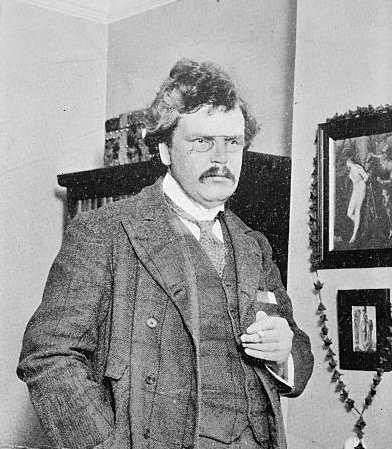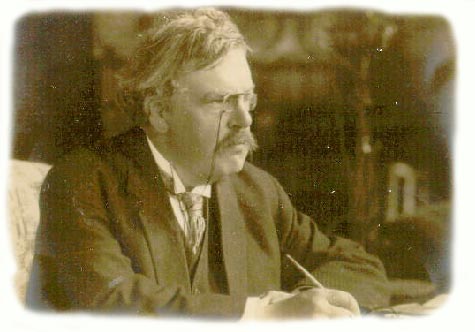<Back to Index>
- Philosopher Oswald Arnold Gottfried Spengler, 1880
- Author Gilbert Keith Chesterton, 1874
- 35th President of the United States John Fitzgerald "Jack" Kennedy, 1917


Gilbert Keith Chesterton (29 May 1874 – 14 June 1936) was an English writer. His prolific and diverse output included philosophy, ontology, poetry, journalism, biography, Christian apologetics, fantasy and detective fiction.
Chesterton has been called the "prince of paradox". Time magazine,
in a review of a biography of Chesterton, observed of his writing
style: "Whenever possible Chesterton made his points with popular
sayings, proverbs, allegories—first carefully turning them inside out." For
example, Chesterton wrote the following: "Thieves respect property.
They merely wish the property to become their property that they may
more perfectly respect it." Chesterton is well known for his reasoned apologetics and even some of those who disagree with him have recognized the universal appeal of such works as Orthodoxy and The Everlasting Man. Chesterton, as a political thinker, cast aspersions on both liberalism and conservatism, saying: "The
whole modern world has divided itself into Conservatives and
Progressives. The business of Progressives is to go on making mistakes.
The business of the Conservatives is to prevent the mistakes from being
corrected." Chesterton routinely referred to himself as an "orthodox" Christian, and came to identify such a position with Catholicism more and more, eventually converting to Roman Catholicism from Anglicanism. George Bernard Shaw, Chesterton's "friendly enemy" according to Time, said of him, "He was a man of colossal genius". Born in Campden Hill in Kensington, London, Chesterton was educated at St Paul's School. He attended the Slade School of Art in order to become an illustrator and also took literature classes at University College London but
did not complete a degree at either. In 1896 Chesterton began working
for the London publisher Redway, and T. Fisher Unwin, where he remained
until 1902. During this period he also undertook his first journalistic
work as a freelance art
and literary critic. In 1901 he married Frances Blogg, to whom he
remained married for the rest of his life. In 1902 he was given a
weekly opinion column in the Daily News, followed in 1905 by a weekly column in The Illustrated London News, for which he would continue to write for the next thirty years. According to Chesterton, as a young man he became fascinated with the occult and, along with his brother Cecil, experimented with Ouija boards. However, as he grew older, he became an increasingly orthodox Christian, culminating in his conversion to Roman Catholicism in 1922. Chesterton was a large man, standing 6 feet 4 inches (1.93 m) and weighing around 21 stone (134 kg
or 294 lb). His girth gave rise to a famous anecdote. During World
War I a lady in London asked why he wasn't 'out at the Front'; he
replied, 'If you go round to the side, you will see that I am.' On another occasion he remarked to his friend George Bernard Shaw,
'To look at you, anyone would think there was a famine in England.'
Shaw retorted, 'To look at you, anyone would think you caused it.' P. G. Wodehouse once described a very loud crash as "a sound like Chesterton falling onto a sheet of tin." He usually wore a cape and a crumpled hat, with a swordstick in hand, and had a cigar hanging out of his mouth. He would sometimes carry a knife and a loaded revolver.
Chesterton often forgot where he was supposed to be going and would
miss the train that was supposed to take him there. It is reported that
on several occasions he sent a telegram to his wife, Frances Blogg,
from some distant (and incorrect) location, writing such things as "Am
at Market Harborough. Where ought I to be?" to which she would reply, "Home." Due
to these memory problems and the fact Chesterton was extremely clumsy
as a child, some people have speculated that Chesterton had undiagnosed developmental dyspraxia. Chesterton loved to debate, often engaging in friendly public disputes with such men as George Bernard Shaw, H. G. Wells, Bertrand Russell and Clarence Darrow. According to his autobiography, he and Shaw played cowboys in a silent movie that was never released. Chesterton died on 14 June 1936, at his home in Beaconsfield, Buckinghamshire. The homily at Chesterton's Requiem Mass in Westminster Cathedral, London, was delivered by Ronald Knox. He is buried in Beaconsfield in the Catholic Cemetery. Chesterton's estate was probated at 28,389 pounds sterling, approximately equivalent to £1.3 million in modern terms. Chesterton wrote around 80 books, several hundred poems, some 200 short stories, 4000 essays, and several plays. He was a literary and social critic, historian, playwright, novelist, Catholic theologian and apologist, debater, and mystery writer. He was a columnist for the Daily News, the Illustrated London News, and his own paper, G. K.'s Weekly; he also wrote articles for the Encyclopædia Britannica, including the entry on Charles Dickens and part of the entry on Humour in the 14th edition (1929). His best-known character is the priest-detective Father Brown, who appeared only in short stories, while The Man Who Was Thursday is
arguably his best-known novel. He was a convinced Christian long before
he was received into the Catholic Church, and Christian themes and
symbolism appear in much of his writing. In the United States, his
writings on distributism were popularized through The American Review, published by Seward Collins in New York. Much of his poetry is little known, though well reflecting his beliefs and opinions. The best written is probably Lepanto, with The Rolling English Road the most familiar, and The Secret People perhaps the most quoted ("we are the people of England; and we have not spoken yet"). Two other much admired poems are A Ballade of Suicide and The Ballad of the White Horse. Of his nonfiction, Charles Dickens: A Critical Study (1906) has received some of the broadest-based praise.